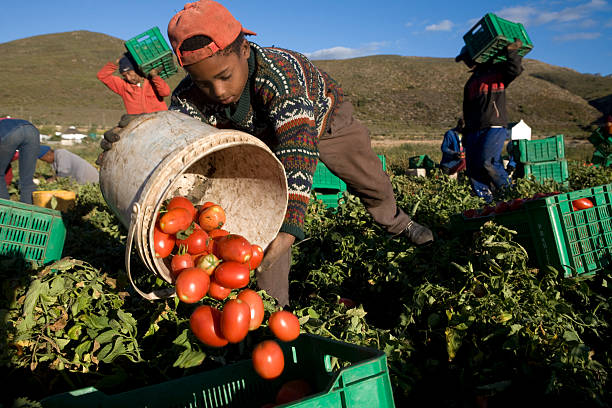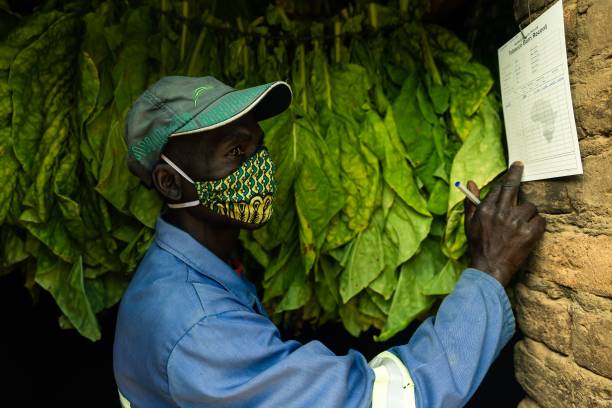As global leaders assemble in Glasgow for the COP26 conference, it is imperative that they do not forget about the people most at-risk from increasing global temperatures, particularly in Africa.
The conference is a real opportunity for world leaders to acknowledge major global issues associated with climate change. Specifically, food security must be prioritised in discussions, as it is one of the major issues in sub-Saharan Africa that is only forecast to worsen as temperatures continue to rise, in turn threatening to exacerbate poverty and disease on a continent desperate for change , writes Zuneid Yousuf, Chairman African Green Resources (AGR).
I know all too-well the issues facing citizens, and in particular, smallholder farmers in sub-Saharan Africa due to my decades of working with them in Zambia, a country where agriculture contributes 20% to total GDP. Like Zambia’s farmers, I know that if temperatures continue to rise, the problems will only mount. 25% of our population faces high levels of acute food insecurity (over 1.7 million people). Climate change is already compounding this, and the forecast makes for grim reading for Zambians.
In Glasgow this week, Zambia’s new president, Hakainde Hichilema, highlighted domestic action in Zambia being taken to contribute to global climate change mitigation strategies.
“We have pledged to reduce greenhouse gas emissions by 25% based on the 2010 levels by 2030 using a combination of our own domestic resources and other support that we have traditionally received,” explained Hichilema.
“Zambia is willing and ready to support your leadership and will work closely with the global community in resolving this challenge,” added Hichilema to UK Prime Minister Boris Johnson.
The World Bank estimates that if global warming continues at the current rate, crop yields in Zambia will decrease 25% by 2050, and that in the next 10-20 years, climate change-related losses (for example from increased droughts) will reach between $2.2-3.1 billion. This would be devastating for a country already suffering from food insecurity on a mass scale, and therefore requires urgent action from both within Zambia and beyond.
Speaking in October, former United Nations Secretary-General Ban Ki-Moon drew attention to the issues facing smallholder farmers and how important COP26 therefore is.
“If we want a world free of hunger and poverty while adapting to and mitigating the climate crisis, we need to put smallholder farmers right at the centre of our efforts to tackle these issues,£ said the former UN Secretary-General.
Illustrating the importance of investing in new technologies, coherent policies, and crucially providing financial aid to such farmers, he called for action to be taken in order to mitigate climate emissions and food insecurity.
We await concrete policy commitments from the conference, but I remain optimistic that global leaders can see the gravity of the situation in front of them, recognising that they are in a position to help countries like Zambia. During a global pandemic which has further worsened inequality and poverty in such regions, there could be no better time for firm action.

Fortunately, it appears that Hichilema has prioritised domestic action in Zambia to help the agriculture sector navigate this storm. During his election campaign, Hichilema highlighted the importance of agriculture to the country’s economy and way of life, drawing comparisons with his upbringing as a humble cattle farmer.
We can now see that these were not false promises, and that action is already being taken to help smallholder farmers in the country through multiple investment initiatives.
In September this year, Hichilema spoke at the UN Food Systems Summit in New York City, outlining key initiatives that his new government was undertaking at home. ‘We are working on expanding and improving the provision of agriculture extension services and equipment as well as provide affordable tailored financial products to small-scale farmers’ said Hichilema.
Zambia’s government is already investigating the possibility of reducing the cost of fertiliser by more than 50%, and in October, alongside Minister of Agriculture Mtolo Phiri, Hichilema further reinforced key pledges made to the backbone of Zambia’s economy. ‘We are working on reforms to make Zambian people more food secure’, said Phiri before announcing reforms to Zambia’s Farmer Input Support Programme whereby farmers now receive six free bags of fertiliser and 10kg of seed for this farming season.
Such changes are warmly welcomed by farmers and citizens alike in the country, but it is essential that larger action is taken given the seriousness of the climate emergency.
Later in October, Zambia’s government announced a new investment partnership with the European Investment Bank (EIB) and Zanaco, Zambia’s national commercial bank. The $35 million initiative will lead to the ‘improving of access to finance’ for smallholder farmers according to Mukwandi Chibesakunda, CEO of Zanaco.
Combined with the establishment of the African Continental Free Trade Area (AfCFTA), such initiatives will work in conjunction with the new administration’s efforts to rightfully shine the spotlight on Zambia’s farmers.
This is what we have been talking about… Zambia is open for business through joint ventures’ asserted Hichilema after the news of the investment agreement.

Like Hichilema, I have always believed in Zambia, its people, its resource-rich land, and its potential. This is precisely why I established African Green Resources (AGR). I too acknowledge the issues facing Zambia’s critical agriculture sector and therefore wish to use my expertise to attract further investment to this great country that is desperate to reach its incredible potential.
AGR aims to enable smallholder farmers to maximize their crop yields by creating a sustainable agricultural economy via the facilitation of agricultural credit, raw products such as fertiliser, and working capital for equipment leases. We have been active both before and since Hichilema’s election, with numerous multi-million-dollar investments in the country, working with global partners. Furthermore, we plan to invest a further $150m in projects in Zambia including a 50-megawatt solar farm and irrigation dam to further assist with sustainable agricultural endeavours in the country that I believe in.
It is my hope that such investments will inspire others to also see Zambia’s massive potential that is waiting to be unleashed, and that, crucially, investments like this can lead to a better and more sustainable future for all Zambians.
The issue of food security needs be at the centre of climate deliberations, and it is fundamental that action is taken by the global community to mitigate climate warming that could further exacerbate the issue facing the population.
Read original story on EU Reporter

